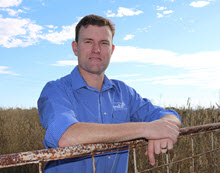MLA’s new approach to boosting producer skills
24 March 2017

Red meat producers will have long-term access to specialist coaches to help boost their management skills and increase on-farm adoption of research and development (R&D) under a ground-breaking new program to be launched by Meat & Livestock Australia (MLA) this year.
It follows the successful pilot of the Profitable Grazing Systems (PGS) project involving 130 red meat producers throughout Australia in 2016.
The trial included 10 groups of beef, sheepmeat and goatmeat producers working together in a supported learning environment under the long-term guidance of specialist coaches in all states and territories. The MLA Board have approved a full roll out of the PGS program after reviewing the pilot’s results.
Meat & Livestock Australia’s General Manager – Producer Consultation & Adoption, Michael Crowley, said the aim of the PGS program was to encourage and support red meat producers to improve management skills and help lift productivity and profitability by 2.5% return on assets managed by 2022.
“The PGS pilot program has clearly highlighted that industry is ready for change and a new approach to on-farm extension and adoption. MLA is in a position to capitalise on the momentum and interest generated by the pilot project and previous programs. We will commence the roll out of the new program this year,” Mr Crowley said.
A total of 130 producers and 96 businesses participated in the pilot with an average 26,000 hectares and a total of more than 1.5 million hectares under management.
“A mid-term review of the PGS pilot found that producer knowledge, attitude, skills and aspiration (KASA) audit scores increased from an average of 46% before the pilot started, to 76%,” Mr Crowley said.
“This is a positive result and indicates that producers who participated in the pilot are well on the pathway to skill development.
“Results of the pilot over a nine-month period have shown producers who implemented changes within the supported learning pilot also demonstrated an increase in profitability when compared to their peers. It is anticipated that the full benefit of participating in the pilot will be measured and experienced by producers in the long-term as they continue to implement more on-farm changes.”
Producers were also asked about their intention to make management changes as a result of the PGS pilot project in the mid-term review.
For 8 out of 10 groups, all participants indicated they had either “made changes already” or that they “intend to make changes” as a result of the program. Those changes ranged from adoption of technologies or infrastructure improvements, to changes in grazing management practices, use of feed budgeting, condition scoring livestock, setting goals and planning, improving financial management and record keeping.
The top three benefits producers indicated they received from participating in the PGS pilot project were learning new skills and how to apply them to individual farming systems; seeing and hearing what other producers are doing; and the opportunity to put numbers around decision-making.
Mr Crowley said the PGS program builds on the tools and resources of MLA’s flagship extension and adoption programs, including Making More from Sheep and More Beef from Pastures.
“Coinciding with this is a desire from MLA to achieve a measureable impact on red meat business profitability through the delivery of extension and adoption programs where there is limited public extension provision,” Mr Crowley said.
“MLA’s 2014 situation analyses of the profitability of the northern beef, southern beef and sheep industries identified increased business profitability can be achieved through capability development targeting key profit drivers and financial literacy and management.
“The PGS project will deliver major benefits after five years, with an upfront investment in deliverer capability. There will also be an ongoing transition to a 'user pays' approach that will ensure sustainable investment and long term commitment.”
Full roll out details of the Profitable Grazing Systems program will be available soon.


